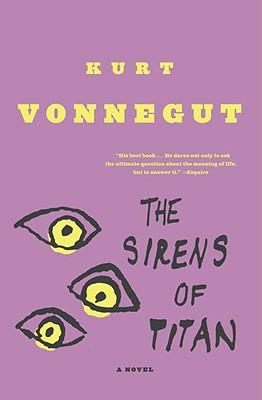-

Slaughterhouse Five
Kurt Vonnegut's absurdist classic Slaughterhouse-Five introduces us to Billy Pilgrim, a man who becomes 'unstuck in time' after he is abducted by aliens from the planet Tralfamadore. In a plot-scrambling display of virtuosity, we follow Pilgrim simultaneously through all phases of his life, concentrating on his (and Vonnegut's) shattering experience as an American prisoner of war who witnesses the firebombing of Dresden. Slaughterhouse-Five is not only Vonnegut's most powerful book, it is also as important as any written since 1945. Like Catch-22, it fashions the author's experiences in the Second World War into an eloquent and deeply funny plea against butchery in the service of authority. Slaughterhouse-Five boasts the same imagination, humanity, and gleeful appreciation of the absurd found in Vonnegut's other works, but the book's basis in rock-hard, tragic fact gives it unique poignancy -- and humor. -

A Man without a Country
A Man Without a Country is Kurt Vonnegut's hilarious and razor-sharp look at life ("If I die-God forbid-I would like to go to heaven to ask somebody in charge up there, 'Hey, what was the good news and what was the bad news?'"), art ("To practice any art, no matter how well or badly, is a way to make your soul grow. So do it."), politics ("I asked former Yankees pitcher Jim Bouton what he thought of our great victory over Iraq and he said, 'Mohammed Ali versus Mr. Rogers.'"), and the condition of the soul of America today ("What has happened to us?"). Gleaned from short essays and speeches composed over the last five years and plentifully illustrated with artwork by the author throughout, A Man Without a Country gives us Vonnegut both speaking out with indignation and writing tenderly to his fellow Americans, sometimes joking, at other times hopeless, always searching. From Publishers Weekly In his first book since 1999, it's just like old times as Vonnegut (now 82) makes with the deeply black humor in this collection of articles written over the last five years, many from the alternative magazine In These Times. But the pessimistic wisecracks may be wearing thin; the conversational tone of the pieces is like Garrison Keillor with a savage undercurrent. Still, the schtick works fine most of the time, underscored by hand-lettered aphorisms between chapters. Some essays suffer from authorial self-indulgence, however, like taking a dull story about mailing a manuscript and stretching it to interminable lengths. Vonnegut reserves special bile for the "psychopathic personalities" (i.e., "smart, personable people who have no consciences") in the Bush administration, which he accuses of invading Iraq so America can score more of the oil to which we have become addicted. People, he says, are just "chimpanzees who get crazy drunk on power." Of course, that's exactly the sort of misanthropy hardcore Vonnegut fans will lap up—the online versions of these pieces are already described as the most popular Web pages in the history of In These Times. (Sept.) Copyright © Reed Business Information, a division of Reed Elsevier Inc. All rights reserved. -

Player Piano
Kurt Vonnegut’s first novel spins the chilling tale of engineer Paul Proteus, who must find a way to live in a world dominated by a supercomputer and run completely by machines. Paul’s rebellion is vintage Vonnegut—wildly funny, deadly serious, and terrifyingly close to reality. -

The Sirens of Titan
The Sirens of Titan is an outrageous romp through space, time, and morality. The richest, most depraved man on Earth, Malachi Constant, is offered a chance to take a space journey to distant worlds with a beautiful woman at his side. Of course there’s a catch to the invitation–and a prophetic vision about the purpose of human life that only Vonnegut has the courage to tell. -

Slaughter House Five
Kurt Vonnegut's absurdist classic Slaughterhouse-Five introduces us to Billy Pilgrim, a man who becomes 'unstuck in time' after he is abducted by aliens from the planet Tralfamadore. In a plot-scrambling display of virtuosity, we follow Pilgrim simultaneously through all phases of his life, concentrating on his (and Vonnegut's) shattering experience as an American prisoner of war who witnesses the firebombing of Dresden. Slaughterhouse-Five is not only Vonnegut's most powerful book, it is also as important as any written since 1945. Like Catch-22, it fashions the author's experiences in the Second World War into an eloquent and deeply funny plea against butchery in the service of authority. Slaughterhouse-Five boasts the same imagination, humanity, and gleeful appreciation of the absurd found in Vonnegut's other works, but the book's basis in rock-hard, tragic fact gives it unique poignancy -- and humor. -

Breakfast of Champions
Breakfast Of Champions is vintage Vonnegut. One of his favorite characters, aging writer Kilgore Trout, finds to his horror that a Midwest car dealer is taking his fiction as truth. The result is murderously funny satire as Vonnegut looks at war, sex, racism, success, politics, and pollution in America and reminds us how to see the truth.